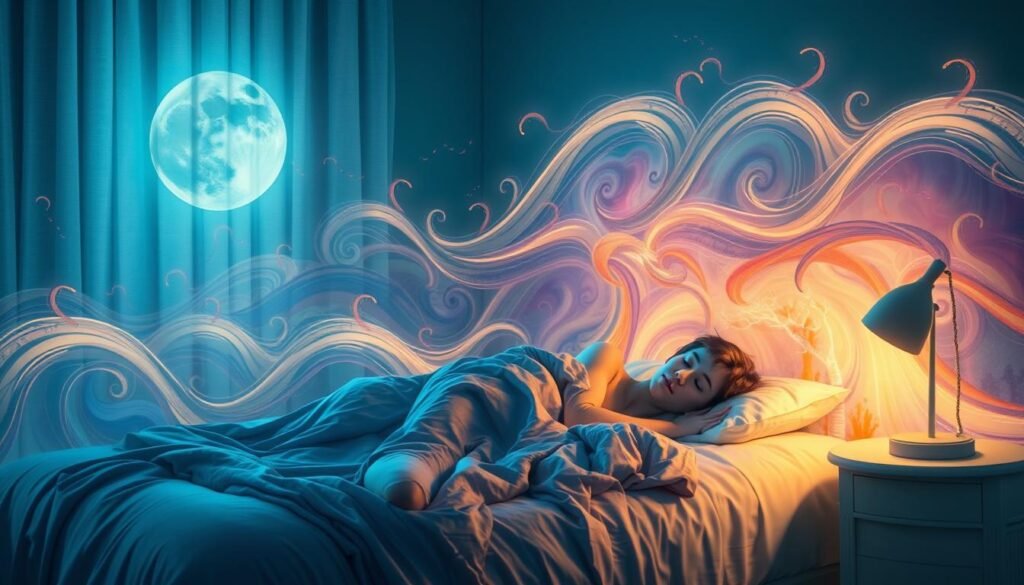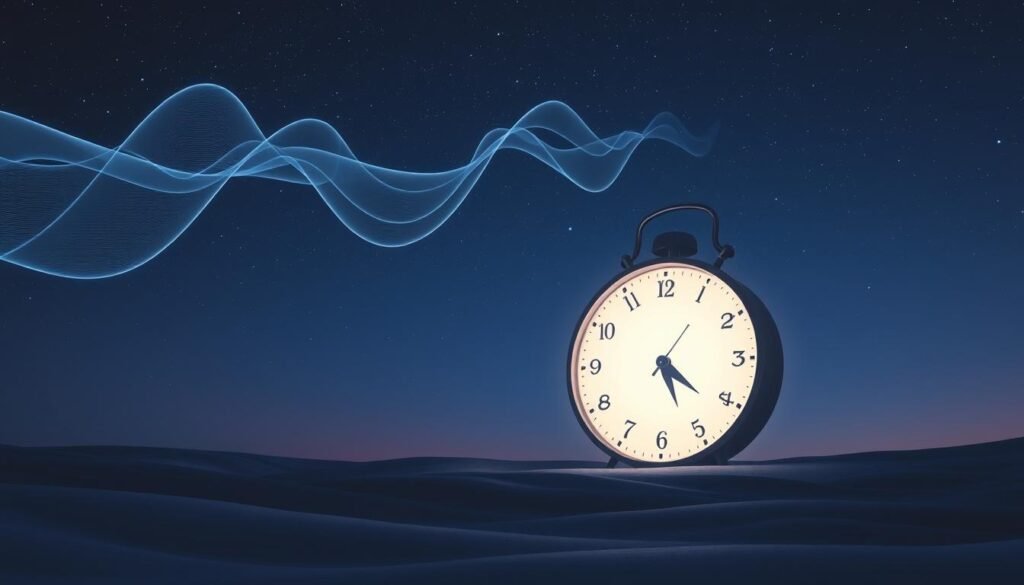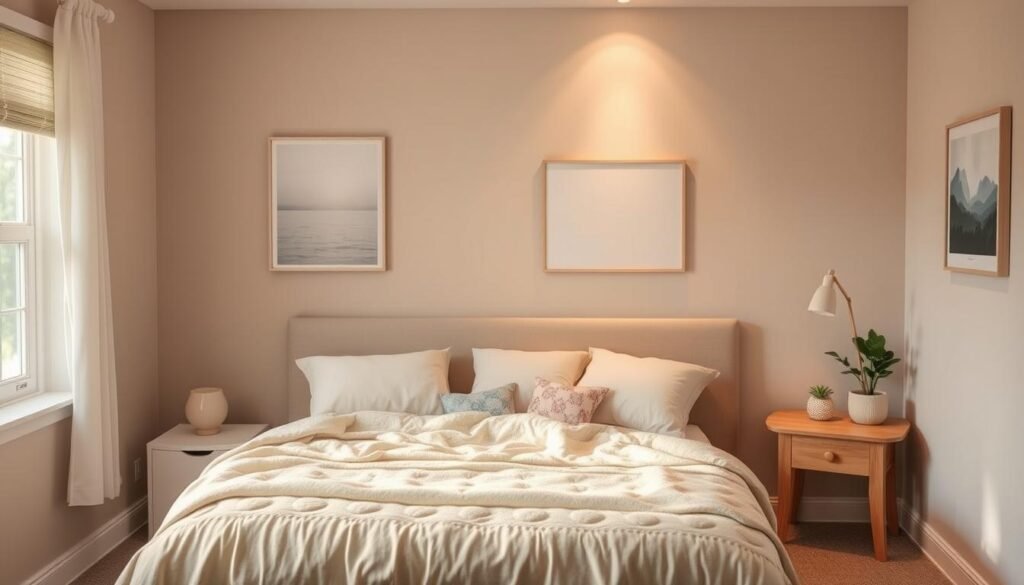Did you know that 50% to 80% of kids with Autism Spectrum Disorder (ASD) have trouble sleeping? That’s much higher than the 20-30% of neurotypical kids who face sleep issues. Sleep problems are a big concern for people with autism and their families. Poor sleep can affect everyone’s life quality.
It’s important to look at how common and what types of sleep issues those with ASD deal with. These problems can greatly change their day-to-day life and how they interact with others.
Key Takeaways
- 1 in every 40 to 59 children in the US is affected by Autism Spectrum Disorder.
- Prevalence rates of ASD have doubled between 2000-2002 and 2010-2012.
- Children with ASD are significantly more likely to face sleep issues than their neurotypical peers.
- Common sleep complaints include insomnia, anxiety, and night waking.
- Sleep problems can negatively impact family dynamics and overall well-being.
- Shared genetic mechanisms may contribute to both ASD and sleep difficulties.
- Non-pharmacotherapeutic measures, such as establishing bedtime routines, can be effective in managing sleep disturbances.
Understanding Autism Spectrum Disorder (ASD)
Autism Spectrum Disorder (ASD) is a complex condition. It mainly involves difficulty with social skills, communication, and behavior. Each person with ASD characteristics is unique, which means they experience these challenges differently. It’s important to understand this to support and help them better.
Both genetics and the environment play a role in causing autism. Nowadays, about 1 in 40 kids in the United States are diagnosed with it. This shows autism is becoming more common, making it vital for us to know more and support affected families.
Sleep issues often trouble people with autism, affecting 50% to 80% of them. This is much more than the 25% to 40% in children who develop typically. Addressing these sleep problems is key to improving overall well-being in autism.
Learning about autism is key. It helps us see how symptoms and problems, like sleep, affect daily life. Knowing more is a big step towards improving life for those with autism. Check out more about autism and sleep here: Understanding autism.
Prevalence of Sleep Disturbances in Individuals with Autism
Many children with autism spectrum disorder (ASD) have trouble sleeping. Studies show that 40% to 80% of kids with ASD face sleep issues. On the other hand, only 25% to 40% of kids without autism have these problems. This difference highlights how serious sleep disturbances are in the autism community. These can include trouble falling asleep, waking up often at night, and fears related to sleep.
For those with lower-functioning autism, sleep problems are even more common. Their sleep-wake cycles tend to be more disrupted compared to children with higher-functioning autism. The main sleep difficulties they face are:
- Prolonged sleep latency
- Decreased sleep efficiency
- Reduced total sleep time
- Increased waking after sleep-onset
- Bedtime resistance
- Daytime sleepiness
Sleep problems don’t just affect the person with autism. They also impact their families and caregivers. Caregivers often feel more stressed when trying to manage these sleep issues. There’s a clear connection between sleep quality and behavior in kids with autism. Addressing sleep concerns can lead to better behavior, less irritability, and less anxiety.
Types of Sleep Disorders Commonly Associated with Autism
People with autism often struggle with sleep problems. These issues can greatly affect their day-to-day lives. Around 50% to 80% of autistic children, and about 80% of adults, face sleep challenges. They might have insomnia, sleep apnea, restless legs syndrome, and parasomnias like night terrors and nightmares.
For many autistic kids, going to bed is hard. They may resist bedtime, making it tough for parents to set a routine. It often takes them more than 20 minutes just to fall asleep. They also tend to wake up early and find it hard to fall back asleep. Nightmares, sleepwalking, and bedwetting are also common issues for these kids.
Sleep apnea is another common condition, where breathing stops and starts during sleep. This disrupts sleep and can make other behavioral challenges worse. Autistic people might also spend less time in REM sleep. REM sleep is key for restoring our bodies and brains—they get about 15%, while others get around 25%.
Studies show that autistic individuals often have more sleep problems if they also have high sensory sensitivities and trouble with executive functions. Poor sleep can make behavioral issues more severe, highlighting the need for addressing these sleep problems.
| Type of Sleep Disorder | Description | Common Symptoms |
|---|---|---|
| Insomnia | Difficulties falling asleep and maintaining sleep. | Restlessness, early morning wakings, trouble returning to sleep. |
| Sleep Apnea | Interrupted breathing during sleep. | Snoring, gasping for air, daytime fatigue. |
| Restless Legs Syndrome | Uncomfortable sensations in the legs leading to an urge to move. | Urge to move legs, discomfort at night. |
| Parasomnias | Abnormal behaviors during sleep such as sleepwalking or night terrors. | Nightmare episodes, sleepwalking, confusion upon awakening. |
It’s essential to tackle these sleep issues for individuals with autism to improve their well-being. For more details on how sleep disturbances impact autism, check out this resource.
The Connection Between Autism and Sleep Disturbances
There’s a close link between autism and sleep issues. These problems are big for those with autism. Learning about them helps us see how sleep affects autism symptoms. It also shows why we need special programs to help.
Insomnia and its Effects on Individuals with ASD
Many kids with autism struggle with insomnia, about 50 to 80 percent. It can make them moody, behave badly, and think less clearly. Not getting enough sleep can make them more anxious, aggressive, and restless. This makes autism and sleep problems worse. Plus, these kids often repeat the same actions, which complicates sleep even more.
Understanding Sleep Apnea in Autistic Individuals
A lot of people with autism also have sleep apnea. Studies show it’s more common in kids with autism. Sleep apnea breaks their sleep and makes them tired during the day. This affects how well they think, pay attention, and live their lives. Finding and treating sleep apnea could improve how they function day-to-day. It could also make their lives better overall.

Possible Causes of Sleep Disturbances in Autism
Understanding sleep disturbances in autism is vital. Behavioral issues play a big role in sleep quality. Anxiety, hyperactivity, and sleep issues can make bedtime hard.
Impact of Behavioral Issues on Sleep Quality
Behavioral issues strongly affect sleep in kids with autism. Research shows that problem behaviors link to worse sleep problems. Tantrums, impulsivity, and bedtime conflicts disrupt sleep. Anxiety and mood changes also cause sleep issues.
Role of Co-occurring Conditions such as ADHD and Anxiety
Conditions like ADHD and anxiety impact sleep in autism. These issues add extra challenges. Kids with ADHD often have sleep problems, worsening sleep in autism. Anxiety can make relaxing at bedtime tough. Recognizing these problems helps in treating sleep issues better.
The Role of Circadian Rhythm Disturbances in Autism
Studies show that people with autism often have disrupted circadian rhythms. This affects their overall health and their sleep patterns. Around 50 to 80% of those with autism spectrum disorders struggle with sleep disturbances. These issues are linked to changes in their sleep cycles. Factors such as genetic mutations and environmental factors make it worse.

Genes play a big role in these sleep issues. Genes like Clock, Bmal1, Cry1, and Cry2 are connected to irregular sleep in autism. Changes in genes that control melatonin affect how much melatonin the body makes. This leads to issues with the circadian sleep cycle.
The link between brain development and sleep disturbances is important. Changes in the circadian system can affect the sleep system. This might harm brain growth. Research shows that circadian rhythm disruptions can make the risks of autism symptoms higher. This creates a cycle where sleep problems can increase autistic features.
- Disrupted circadian rhythms impact cognitive and emotional areas in individuals with autism.
- Research suggests a bidirectional relationship between circadian sleep dysfunction and the development of autistic symptoms.
- Addressing circadian rhythm disturbances may improve treatment outcomes for affected individuals.
It’s vital to understand how autism and circadian rhythm disturbances are connected. Focusing on managing the sleep-wake cycle in ASD can improve life quality. This helps caregivers and health pros support those on the spectrum better.
Melatonin Levels and Sleep Quality in Autism
Melatonin is key for sleep in those with autism. It helps regulate sleep but might be low in autistic people. Studies show they often have less melatonin, affecting their sleep quality.
Understanding the Importance of Melatonin
Melatonin is vital for starting and keeping sleep. In kids with autism, it can really help them sleep better. By taking supplements, they can fall asleep faster and wake up less at night.
Here’s what research on autism and melatonin shows:
- 80% of those with autism have trouble sleeping.
- They often don’t get enough deep sleep or have normal dream sleep.
- Melatonin treatments work well for falling asleep, staying asleep, and not waking up as much.
- Better sleep can make life much better for these children and their families.
Melatonin is helpful but can have side effects like nausea and headaches. Parents should talk to doctors about using melatonin safely. To get the most out of it, it’s important to use it at the right time and watch how it works.
| Effect of Melatonin Treatment | Percentage of Children Reporting Improvement |
|---|---|
| Improved Sleep Onset | 86% |
| Enhanced Sleep Duration | 54% |
| Decreased Night Awakenings | 45% |
| Improvement in Daytime Behaviors | 28% |
Strategies for Improving Sleep Hygiene in Autistic Individuals
Improving sleep hygiene in those with autism is essential for their health and happiness. Caregivers and parents can use special strategies to help. This helps create an environment that makes good sleep easier.
Establishing a Bedtime Routine
Having a regular bedtime routine is key. It involves doing the same relaxing things each night to tell your body it’s time to sleep. Some good habits include:
- Going to bed and getting up at the same time every day.
- Reading, deep breathing, or listening to calm music before bed.
- Using a bedtime pass to help kids handle waking up at night.
- Not using screens for at least two hours before sleep to improve melatonin levels and sleep patterns.
Creating a Conducive Sleep Environment
To make sleeping easier for those with autism, their rooms should be set up carefully. Tips include:
- Keeping the room at a cool 65° – 67° F for better sleep.
- Using blackout curtains to keep the room dark.
- Utilizing white noise or soothing sounds to block outside noise.
- Having a clean, organized room to decrease stress and aid in relaxing.
Better sleep hygiene may also involve looking at diet, exercise, and how to manage stress, as they all affect sleep. For more tips and tools, see strategies to improve sleep in children with. Trying natural sleep aids might also help improve sleep quality. Learn more about natural sleep aids that could work for autistic individuals.

| Strategy | Description |
|---|---|
| Consistent Bedtime Schedule | Having fixed times for going to bed and waking up to help set the body’s internal clock. |
| Calming Activities | Doing peaceful activities to unwind before sleeping. |
| Optimal Sleep Environment | Making the bedroom ideal for sleeping by keeping it dark and quiet. |
| Screen Time Limitation | Avoiding electronic devices before bedtime to improve sleep quality. |
Possible Treatments and Interventions for Sleep Disturbances
Addressing sleep disturbances in people with autism spectrum disorder (ASD) takes careful planning. There are many ways to help, from behavior changes to taking medicine for sleep. These strategies have been proven to work well.
Behavioral Interventions and Therapy Options
Changing behavior is usually the first step in solving sleep problems. Methods like Cognitive Behavioral Therapy for Insomnia (CBT-I) teach better sleep habits. They also help with stress management. Keeping a regular bedtime and a calm routine at night can lessen insomnia symptoms.
Knowing what behaviors cause poor sleep helps make custom plans for better rest. Programs that teach parents about sleep also help. They equip them to support their children’s sleep needs better.
The Role of Sleep Medication in Autism
Sometimes, changes in behavior or habits aren’t enough, and sleep meds may be needed. Doctors often suggest melatonin for those with ASD struggling to sleep. Around 15% of pediatricians recommend it to their patients with sleep problems.
Research backs up melatonin’s benefits; it helps people fall asleep faster and sleep longer. Some even noticed all sleep problems went away after starting melatonin. Both prescription and non-prescription sleep aids have shown to be safe and effective. They play a crucial role in helping many with ASD get better sleep.
| Treatment Type | Examples | Efficacy Evidence |
|---|---|---|
| Behavioral Interventions | CBT-I, Parent-based sleep education | Effective for developing positive sleep habits |
| Sleep Medication | Melatonin | Studies show improvements in sleep duration and onset |
| Nonmedical Approaches | Good sleep hygiene practices | Recommended as the first line of treatment |
Conclusion
This article has shown there’s a big link between autism and sleep problems. This is important for people with autism and their caregivers. Up to 80% of kids with autism struggle with sleep. This can make their behavior issues worse, affecting their life every day.
It’s vital to keep researching autism and sleep problems. Studies say fixing sleep issues can help with mood, focus, and less impulsivity. Helping people with autism get better sleep is key for their well-being.
In one study, 69 kids with autism and 62 without were compared. Kids with autism had more sleep and sensory issues. This means our solutions must address these sensory issues. For more info, check this article on autism and sleep disturbances. Better sleep can really improve life for those with autism and their families.